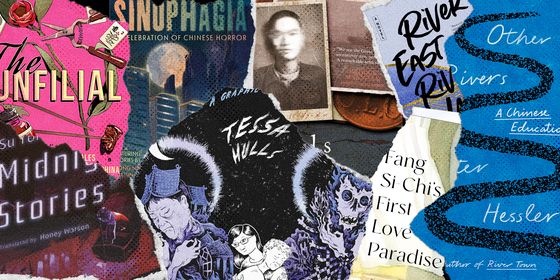Industry insiders and fans discuss China’s web novel craze, its origins, and the impact of AI
Web novels are booming in China right now. According to research by the Chinese Academy of Social Sciences, one in three people regularly read them, and 24 million people have published online literary works since 2023. This has created a prosperous online literature market worth 40 billion yuan (5 billion US dollars).
Some 30 years after China officially connected to the internet, it’s not just e-commerce and social media that have taken off—it also birthed a vast online literary world independent from the traditional publishing industry for people of all ages, educational backgrounds, and walks of life. Some of the biggest movie and TV hits in the past decade were adaptions of web novels, fueling new IPs.
In this podcast episode, host Aladin Farré talks to three industry insiders and observers about the evolution of the industry, the intense experience of writing and publishing amid furious competition online, as well as the future of the industry, especially with the recent rise of generative AI.
Guests:
Tage (踏歌) is an author based in Shanghai who has published two web novels and several short stories, mostly on the digital literature platform Douban Read (豆瓣阅读).
Yang Zeyi is a technology reporter based in New York who writes about China for the MIT Technology Review. He used to be an avid reader of Chinese web novels.
Wei Xiaoma is an IP licensing manager based in Liaoning province. She works in the film and TV industry, particularly on the adaption rights of web novels.
Translator:
Li Muyuan is a podcast producer. She previously appeared on episode 90 where she talked about women in China’s cultural industry.
Subscribe to the Middle Earth Podcast: Apple Podcasts | Spotify | Google Podcasts | Amazon Music | Overcast | RSS Feed
The following are excerpts from the transcript of the episode (edited for clarity):
04:53
Aladin: My first question would be: What is wrong with a paper book? Why have web novels and fanfiction become so big in China compared to other countries?
Yang Zeyi: If we’re talking about the US, there are still some fanfiction sites like AO3 that people go to, that people write very religiously on. But I don’t see the kind of crowd that goes to web novels. I almost feel like maybe it’s because in the US, people have a stronger habit of reading paper books and that just does not transfer that easily to reading online. But in China, it’s just a lot of people who didn’t have a daily habit of reading books but were introduced to the idea of web novels, from an early age, and that became their preferred way of reading and cultural consumption.
09:10
Aladin: Can you describe what web novels are actually like?
Yang Zeyi: Think of web novels as a really long story with hundreds of chapters with the writer updating one chapter maybe once or twice a week. So, it’s like a really long journey they’re going along with the author as a reader. You know that it’s Wednesday today and the writer is going to upload his new chapter and I’m going to read it soon. It’s like waiting for your favorite TV show to be broadcast. In the early days, most of these web novels were free, so there was no obstacle at all if you wanted to read them. Just pop up a browser tab or open your phone wherever you are. And there are probably quite a few different websites republishing the same novel at the same time. So, there are a lot of options for you to choose from if you want to go on this journey.
10:56
Aladin: Tage, you have been writing your own web novel for the past year. Did you have pressure to publish as much content and stories as possible?
Tage: Yes. When you are uploading your work on the web, especially if it’s for a competition [many web novel platforms would organize competitions to encourage authors to update more frequently], it’s very bad if you can’t renew your work daily. Your readers will leave you as soon as they can. So, when you are writing a web novel, it’s a very long journey for you to write things every day and upload them. It’s really hard work.
13:14
Aladin: Xiaoma, since you are working in IP production, could you talk to us about what the market is like for developing business IPs from web novels to films?
Wei Xiaoma: My main job is actually working in a film and television company, where I specialize in selecting content that can be adapted into movies, TV series, or even gaming licenses. This work often involves communication with screenwriters to develop ideas for such projects. Typically, we focus on content that aligns with mainstream trends in film and television, particularly in commercial genres like historical dramas, fantasy, and ancient romance. These genres have the ability to span different mediums, as they can be adapted into long-form TV series or even larger-scale video games. When considering the commercial value of these adaptations, it’s essential to note that the worth of the IP lies in its scale. Whether in the realm of television or gaming, the value of the IP is primarily reflected in the sheer volume it can achieve.
17:45
Aladin: Who are the readers of web novels and what type of works do they like the best? What kind of stories have been the most successful recently?
Yang Zeyi: Back in the days when I was still an avid reader, the ordinary readers of web novels were still pretty young. I would say they were college students, young professionals, people who were very savvy with technology such as websites and smartphones, and who knew how to navigate the system. I do think that has changed because one example I can give is that, my mom has since told me that she will sometimes read a web novel or two. It was really shocking to me because I would never imagine she, in her 50s, would be interested in a web novel, but she is.
So, I think that speaks to just how broad the fan base is now. It’s expanded to absorb a lot of people who probably were not interested in web novels before. We’re talking about more senior people, people who are less educated, people who are in rural areas, or working blue-collar jobs. I do think a lot of them have gotten into reading web novels…
Tage: I think the biggest group are students, students in middle schools and high schools. I started reading novels at that age and I know that at that age, they can have many fantasies and would like to find another world in novels. Also, they have some spare time to read books. When it comes to the popular type of stories, I think romance is always the most popular.
Wei Xiaoma: When we work with the various online literature platforms it’s related to understanding the users’ demographics. However, I must admit that it’s challenging to provide a definitive conclusion in selecting IP for the film and television industry. Our main focus is on assessing the audience, understanding the demographics, and identifying the most impactful user groups. In my opinion, there isn’t necessarily a single mainstream literary form in today’s landscape. Whether it’s romance novels or other genres, they all excel within their respective niches and have substantial and diverse audiences. I’ve even observed individuals in their 50s enjoying genres like fantasy.
22:26
Aladin: So, where is the industry heading?
Wei Xiaoma: Many production companies are now incorporating AI, such as ChatGPT, during the planning and conceptualization stages to generate initial story outlines and basic character profiles. These AI-generated frameworks have proven to be efficient and of decent quality in terms of output. However, at this stage, there is a notable issue with AI-generated content, and that is the challenge of creating truly unique stories. While I may not possess deep knowledge of AI or technology, the essence of exceptional storytelling, whether in film, literature, or any medium, ultimately lies in the author’s keen observations of life and their perception of human existence. If, someday, AI were to attain the same level of perceptiveness, or even surpass it, it is conceivable that AI could indeed replace human creators. Nonetheless, I believe that for us as humans and creators, we must maintain our creative drive and seek inspiration from our surroundings.
Presently, particularly in the context of the evolving landscape of the online literature industry, there is a noticeable trend of weakened communication among authors. All they think about are commercial interests, and it seems the days when directors and authors could sit down together to share ideas and discuss how to interpret literature in film are becoming rarer. Instead, such negotiations are now often facilitated by companies like ours. The emergence of AI might offer an intriguing prospect. If AI can handle all forms of communication, either through big data analysis or other technologies, it might fill the void left by the severed links in the creative chain.
The Middle Earth Podcast is your source of insight into China’s culture industry, where you can hear from people creating and producing content in the world’s second-biggest cultural market. Hosted by Aladin Farré, and presented by The World of Chinese magazine.













